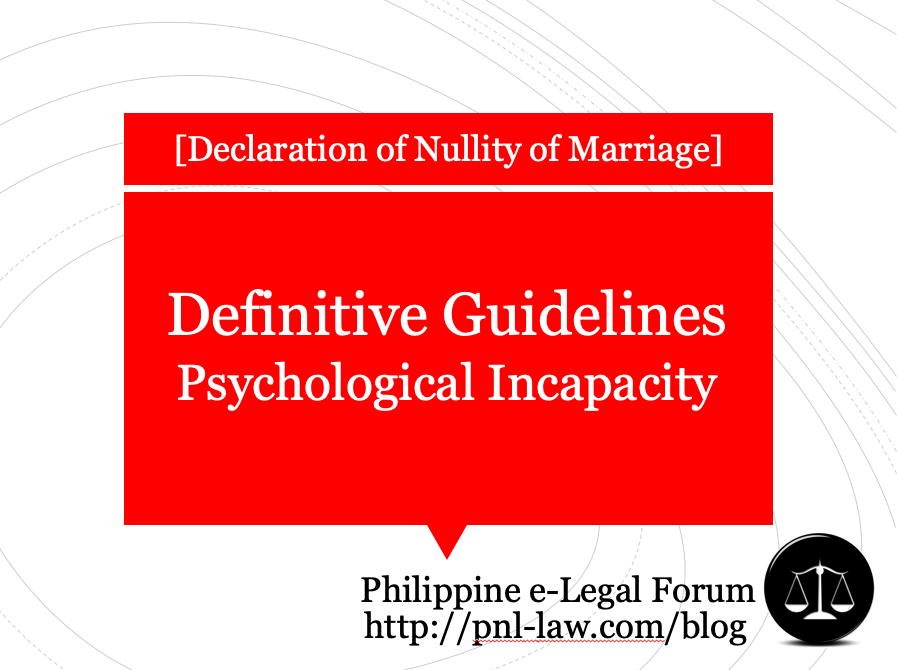A name, according to the Supreme Court in a 2005 case, has two parts: (1) the given or proper name and (2) the surname or family name. The given or proper name is that which is given to the individual at birth or at baptism, to distinguish him from other individuals. The surname or family name is that which identifies the family to which he belongs and is continued from parent to child. Parents are free to select the given name of their child, but the law fixes the surname to which the child is entitled to use.
Continue readingCategory Archives: Family Law
Basic Concepts in Estate Proceedings and Estate Tax
Among the inescapable facts in life, something which everyone shares regardless of status, race, sex or creed, is death. A person may leave properties (or liabilities) upon death, so a discussion on the basic concepts on estate proceedings is in order.
Continue readingBreach of Promise to Marry in the Philippines
Love is not totally alien to law. The Supreme Court once quoted the truism that “the heart has reasons of its own which reason does not know.” Now, what if someone you love promises to marry you but then refuses to honor that promise?
Continue readingLegal Dynamics: Citizenship and Divorce
Discussions are welcome in the Forum. As more subjects here are discussed by the readers, the interaction of one topic with another (or between related laws) results to a legal melting pot, enriching the pool of topics to choose from.
For instance, we have discussed (“Divorce and Annulment in the Philippines“) that a Filipino – wherever he/she may be located in the world – is governed by Philippine laws on marriage. This means that while he/she can secure a divorce outside the Philippines, such divorce is NOT recognized in the Philippines. The same article also contains a discussion on the effect of losing Filipino citizenship vis-a-vis divorce. If a Filipino is naturalized as a foreign citizen and, in the process, loses his/her Filipino citizenship, such former Filipino can validly seek a divorce abroad and the divorce is recognized in the Philippines. In other words, after complying with the procedure in having the foreign decree of divorce judicially recognized (through a court action) here in the Philippines, the Filipino spouse may validly remarry.
Continue readingEffect of Annulment in a Criminal Case for Bigamy in the Philippines
There are persistent questions on the effect of a petition for annulment or a declaration of nullity of marriage on a criminal case for bigamy. It is time to have a discussion on this subject matter (see below).
Continue readingPsychological Incapacity (Article 36, Family Code of the Philippines): More Definitive Guidelines
Among the grounds for annulment of marriage, psychological incapacity is the more (if not the most) commonly used. It is also one of the more controversial provisions of the Family Code. The first set of guidelines were provided in the 1995 Santos case. In the subsequent case of Molina, the Supreme Court provided more definitive guidelines in the interpretation and application of Article 36:

Psychological Incapacity: Habitual Lying (Declaration of Nullity of Marriage in the Philippines)
Just recently, the Supreme Court promulgated a decision (Antonio vs. Reyes, G.R. No. 155800, 10 March 2006) in connection with a petition for declaration of nullity under Article 36 (psychological incapacity) of the Family Code. The Supreme Court sustained the nullity of the marriage based on the psychological incapacity of the wife (respondent). As concluded by the psychiatrist presented by petitioner, such repeated lying is abnormal and pathological and amounts to psychological incapacity.
Continue readingLegal Support for the Child and R.A. 9262
Through all the family cases that we have handled, we have come to accept, without discounting the contrary, the sad fact that bad blood exists between the opposing parties (e.g., estranged spouses in annulment/separation/property cases, siblings and relatives in estate proceedings). In particular, with respect to custody-support cases over children, it is easily understandable that custody is one of the more contested issues. However, the issue on child support should not be as complicated.
Continue readingDivorce and Annulment in the Philippines
Some Filipinos want and do get married outside the Philippines. There’s nothing really strange with this, except when they say that the reason is for convenience in getting a divorce abroad. This is strange for two main reasons:
Continue readingThe Family Code of the Philippines (Executive Order No. 209; full text)
[Full text below. Or see Table of Contents/Directory; Title I, Title II, Title III, Title IV, Title V, Title VI, Title VII, Title VIII, Title IX, Title X, Title XI, and Title XII]
Continue reading